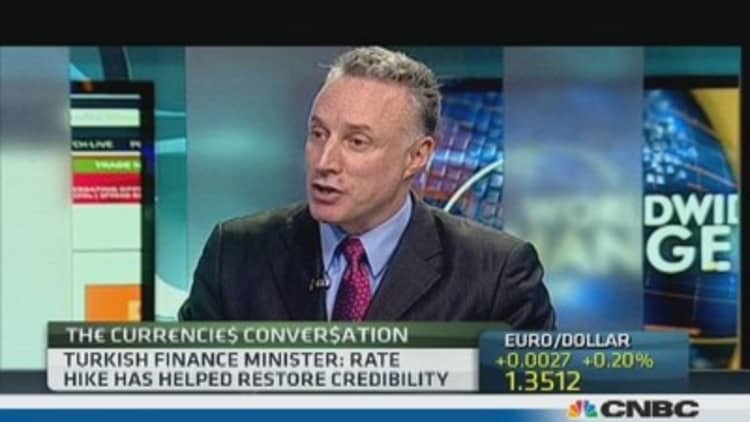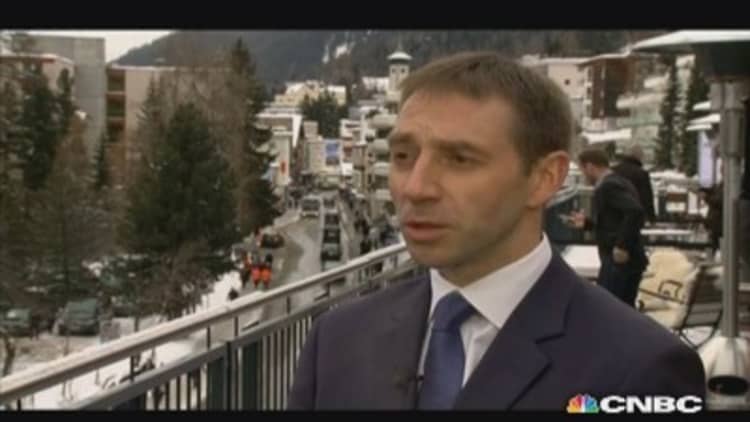After abrupt interest rate rises in India, Turkey and South Africa, investors are now betting that Hungary and Russia will be the next emerging economies forced to defend their currencies, even though their finances look very different.
The three countries that acted last week - including Turkey which raised its rate by a dramatic 425 basis points - all rely heavily on foreign capital to power their economies.
Hungary and Russia, by contrast, run large current account surpluses. However, this has not stopped investors from selling off their currencies during the present rout, where they are lumping emerging markets together often regardless of major differences in the underlying economies.
Markets are pricing in a likelihood that Budapest and Moscow will also have to raise interest rates as the waves of emerging market selling - set off by concerns about Chinese economic growth and the U.S. Federal Reserve's decision to reduce a flood of cheap money - reach their shores.
(Watch: What triggered the emerging market rout?)
The surprise actions by the central banks of India, Turkey and South Africa have eased some pressure on their markets. But this has shifted the focus to other countries where investors are worried about debt levels, inflation or just policymakers' credibility.
Investors have dramatically changed their expectations for Hungary and Russia. According to Societe Generale, interest rate markets are pricing a 167 basis point rate rise in Hungary over the next 12 months, contrasting with expectations of no change just two months ago.
In Russia, markets are pricing rates to rise 58 bps in the next 9 months, swinging from previous bets for a 33 bps cut, although many analysts believe the central bank will not act, at least for the moment.
(Trader poll: Which emerging market currency would you buy?)
Nevertheless, both countries may need to act aggressively to get ahead of market expectations and boost real interest rates - rates adjusted for inflation - to lure foreign capital and restore investors' faith in their monetary policy.
"The focus is what the reaction function of central banks will be. If they are too slow and reluctant, you may see further weakness of currencies. Then we get into a negative spiral here," said Luis Costa, head of CEEMEA strategy at Citi.
Hungary was a prime example, he said. The forint hit a two-year low as concerns grew about the country's debt levels near 80 percent of annual economic output, its record of unconventional economic policies, and elections in April.
"If you want to stabilize your currency, the rationale is to deliver an interest rate shock. Hiking in line with market expectations doesn't work. You need what the Indonesians did."

Indonesia, part of the so-called Fragile Five economies which are vulnerable to capital flight, has managed to avoid a violent sell-off after the rupiah's 20 percent slide against the dollar last year. This is thanks to rates increases totalling 175 bps since June.
Institutional credibility is also vital. "It's less about the distinction between current account deficit and surplus countries, it has more become an issue of who's more credible. It's all about the credibility of political and monetary institutions," said Gaurav Saroliya, strategist at UniCredit.
U-turn
A rate rise would mark a U-turn by the National Bank of Hungary, which cut interest rates to a record low of 2.85 percent in January to support the economy.
Forward rate agreements - futures contracts on short-term deposits used by investors to hedge against interest rate changes - are pricing in a 15 bps rate increase at next week's policy meeting.
(Watch: Trading block: Currencies and natural gas)
Some dealers questioned this market's reliability as a guide, saying that if the central bank moved at all, it would have to make a dramatic gesture like in Turkey. One Budapest bond trader said that 15 bps would be nothing like enough to calm any panic - which in any case did not currently exist.
"Rates will either stay unchanged or will jump," said the trader. "There is no panic in Hungarian debt market, but there is big uncertainty," he added. "Sooner or later the central bank will have to communicate something."
Panic or no panic, the central bank may have no choice.
"These days the game is about positioning for investor expectations," said Benoit Anne, head of emerging market strategy at Societe Generale.
(Watch: The currencies to buy on the emerging markets meltdown)
"If the hedge funds managed to score against (Turkey and South Africa), there is absolutely no reason why they should not be able to score against the National Bank of Hungary."
Analysts say a further forint fall beyond the 2012 record low of about 324 to the euro may force a rate rise. However, a possible rate cut by the European Central Bank this week would boost the forint's premium over the euro and may give some relief.
Rate rises in Brazil or Turkey have not allowed these countries to escape the onslaught of investors who think they are not adequately compensated for risks.
(Read more: Europe markets overview)
In South Africa for instance, investors have almost doubled their rate rise bets, despite the Reserve Bank's surprise 50 bps move last week. Markets now expect a further 245 bps in the next 12 months, compared with 120 bps two months ago.
Currency moves are crucial for foreign investors as exchange rate losses can easily wipe out any gains in the high-yielding emerging world. For example, returns on South African government debt were slightly positive in rand terms in 2013. But in dollar terms, investors lost more than 18 percent, according to Citi's bond index.

The share of foreigners in Hungary's bond markets is among the highest in emerging markets at over 40 percent while the share of non residents in Russia stands at over 25 percent, five times the level of early 2012.
Brazil is set to extend its aggressive rate rises to counter inflation, with investors boosting their tightening bets to 213 bps over the next 12 months from 141 bps in Dec.
Russia's inflation battle
In Russia, the ruble's fall of more than 6 percent against the dollar is threatening to breach the central bank's 5-percent inflation target for the year.
(Watch: Russia will not see 'meaningful return' on Olympics)
Every one percent fall in the ruuble feeds through into an increase of the headline inflation rate of around one decimal point, according to calculations by HSBC.
Russia's reserves fell 7 percent in the year to the end of January to $497 billion, having spent around $10 billion this year to support the rouble. But this is modest compared with 2008-2009 when it spent $200 billion in a matter of weeks.
An exodus of investors is gathering pace, with Russian equity funds tracked by EPFR losing $615 million of flows in the week, the biggest since August 2011.
(Read more: Hungary: could this currency sell of like Argentine's peso?)
The central bank was already forced to fire a verbal warning shot, repeating last week that it would launch unlimited interventions to keep the rouble stable.
"(The central bank) will likely be forced to deliver some form of tightening in case of currency weakness starting to compromise (the) 5 percent inflation target," Bank of America Merrill Lynch said in a client note.
Emerging market central banks which hold policy meetings over the next week include, Poland, the Czech Republic, Romania, Croatia, Serbia, the Philippines, Indonesia and South Korea.
—By Reuters

